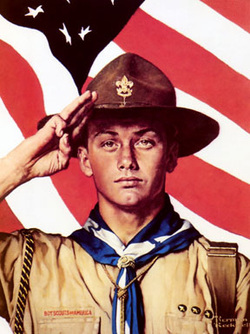History of Scouting

Scouting's history goes back to the turn of the 20th century to a British Army officer, Robert Stephenson Smyth Baden-Powell. While stationed in India, he discovered that his men did not know basic first aid or the elementary means of survival in the outdoors. Baden-Powell realized he needed to teach his men many frontier skills, so he wrote a small handbook called Aids to Scouting, which emphasized resourcefulness, adaptability, and the qualities of leadership that frontier conditions demanded.
Scouting's history goes back to the turn of the 20th century to a British Army officer, Robert Stephenson Smyth Baden-Powell. While stationed in India, he discovered that his men did not know basic first aid or the elementary means of survival in the outdoors. Baden-Powell realized he needed to teach his men many frontier skills, so he wrote a small handbook called Aids to Scouting, which emphasized resourcefulness, adaptability, and the qualities of leadership that frontier conditions demanded.
After returning from the Boer War, where he became famous by protecting the small town of Mafeking for 217 days, Baden-Powell was amazed to find that his little handbook had caught the interest of English boys. They were using it to play the game of scouting.
Baden-Powell had the vision to see some new possibilities, and he decided to test his ideas on boys. In August 1907, he gathered about 20 boys and took them to Brownsea Island in a sheltered bay off England's southern coast. They set up a makeshift camp that would be their home for the next 12 days.
The boys had a great time! They divided into patrols and played games, went on hikes, and learned stalking and pioneering. They learned to cook outdoors without utensils. Scouting began on that island and would sweep the globe in a few years.
After returning from the Boer War, where he became famous by protecting the small town of Mafeking for 217 days, Baden-Powell was amazed to find that his little handbook had caught the interest of English boys. They were using it to play the game of scouting.
Baden-Powell had the vision to see some new possibilities, and he decided to test his ideas on boys. In August 1907, he gathered about 20 boys and took them to Brownsea Island in a sheltered bay off England's southern coast. They set up a makeshift camp that would be their home for the next 12 days.
The boys had a great time! They divided into patrols and played games, went on hikes, and learned stalking and pioneering. They learned to cook outdoors without utensils. Scouting began on that island and would sweep the globe in a few years.
